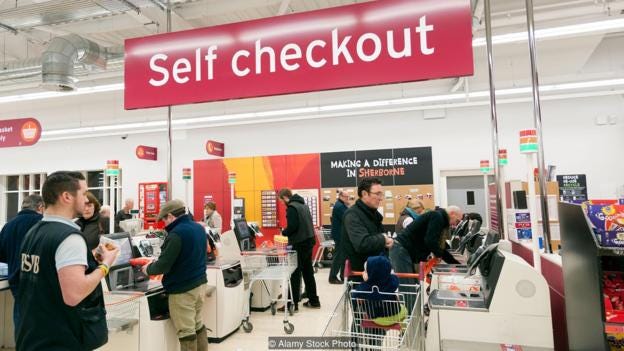As major retailers opt to phase out self-checkout in response to rising theft and technological challenges, the Independent Grocers Alliance (IGA) is doubling down on its commitment to in-person interaction. The Rivertown IGA in New Richmond, Ohio, has emerged as a unique outlier, emphasizing the retention of store clerks over transitioning to self-checkout technologies. IGA customers applaud the decision, citing a preference for the personal touch and assistance from human clerks.

Photo from: Medium
Shopper’s Preference for Human Interaction
In contrast to the growing trend of self-checkout adoption, IGA customer Jennifer Parker expresses her preference for human interaction at the checkout. She cites a tendency to make errors with self-checkout machines and highlights the satisfaction of having a person assist with the process. This sentiment resonates with other customers at the Rivertown IGA in Ohio, where the emphasis on store clerks remains unchanged.
The Rivertown IGA’s marketing director, Heather Frye, notes that the decision to maintain store clerks is driven by positive customer feedback. The clerks are well-liked, and their presence fosters a sense of community as customers engage in conversations and catch up on town happenings. Despite the prevalence of self-checkout in the industry, this IGA location prioritizes the personal touch and aims to continue providing a unique shopping experience.
Self-checkout has become a contentious issue for many retailers, facing challenges such as organized retail crime and theft. According to Matt Schulz, chief credit analyst for LendingTree, 15% of American shoppers admit to stealing from self-checkout. This has prompted major retailers to reevaluate the efficacy of self-checkout systems, impacting both the number of lanes and the overall checkout experience.
READ ALSO: T-Mobile Nationwide Outage Frustrates Hundreds: Cellular Services And Website ‘Unplugged’
Impact on Customer Behavior
Schulz highlights that 40% of customers report almost always using self-checkout, indicating a significant reliance on this technology. However, as major retailers reduce the number of self-checkout lanes, there may be a shift in customer behavior, particularly among the younger generation accustomed to the convenience of self-service options. The ongoing changes in checkout infrastructure could influence shopping preferences and the adoption of alternative technologies.
Despite the evolution of retail technology, IGA remains committed to providing a personal touch through human workers. While other major retailers like Walmart and Safeway are abandoning self-checkout at certain locations due to increasing retail theft, IGA’s Rivertown location stands out as an advocate for preserving traditional checkout methods. The decision to prioritize personal interaction over technological efficiency reflects the grocery chain’s dedication to a unique and customer-centric shopping experience.
READ ALSO: IRS Collects $500 Million From Wealthy Tax Dodgers, GOP Threatens Funding Cuts
















































